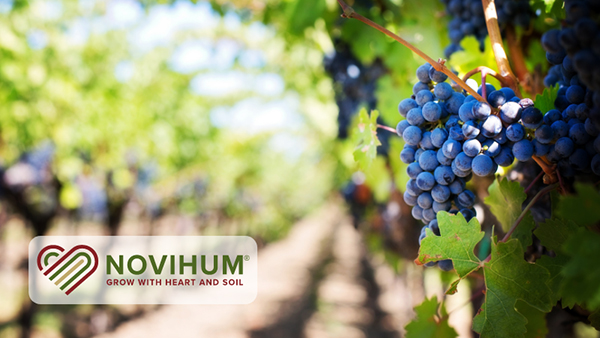Food Hubs Helping Connect Agriculture And Urban Communities
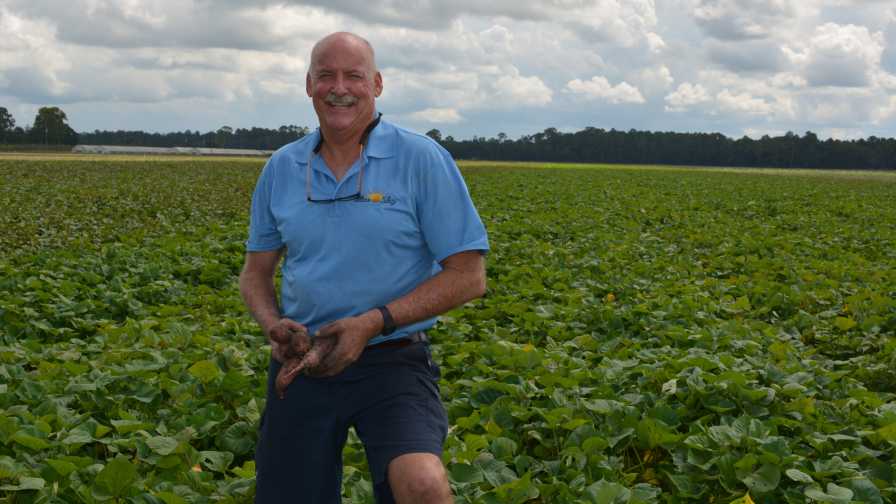
To meet demand and maintain a competitive edge, Danny Johns of Blue Sky Farms in Elkton, FL, has partnered with other growers in the area to provide a food hub for local restaurants, retailers, and consumers.
Photo by Frank Giles
In 2010, Florida Grower® magazine featured St. Johns County farmer Danny Johns’ potato growing operation, Blue Sky Farms. The story was titled “Changing With The Times” for his transition from chip production — where competition was driving prices too low — to table stock potatoes.
While going to table stock was a good move and is still a major part of Blue Sky Farms production, times keep changing. In the past few years, Johns and a few partnering growers have ventured into new waters to maintain their competitive edge. The venture includes dealing direct with consumers through community supported agriculture (CSAs), local restaurants, and retailers. Many new vegetable varieties have been added to the farm’s product offerings.
“We added the table stock potatoes to diversify, but the evolution continues,” Johns says. “The one constant in farming is change, so if you are going to survive in this industry, you have to be open and able to adapt to the next thing.”
One of the challenges for growers dealing direct with consumers and restaurants is producing enough volume to be a reliable supplier of goods. To address this challenge, Johns has embraced the concept of a “food hub” where a number of farms feed produce into a one-stop source in a steady volume.
The food hub Johns and several partner growers have established is First Coast Fresh. At Blue Sky Farms, Johns is growing up to 25 different crops in addition to his traditional potato plantings. Leafy greens, Brussels sprouts, cauliflower, sweet potatoes, and other popular produce items are now being planted.
“We are up to about 20 acres with these vegetable crops and we double crop that land,” he says.
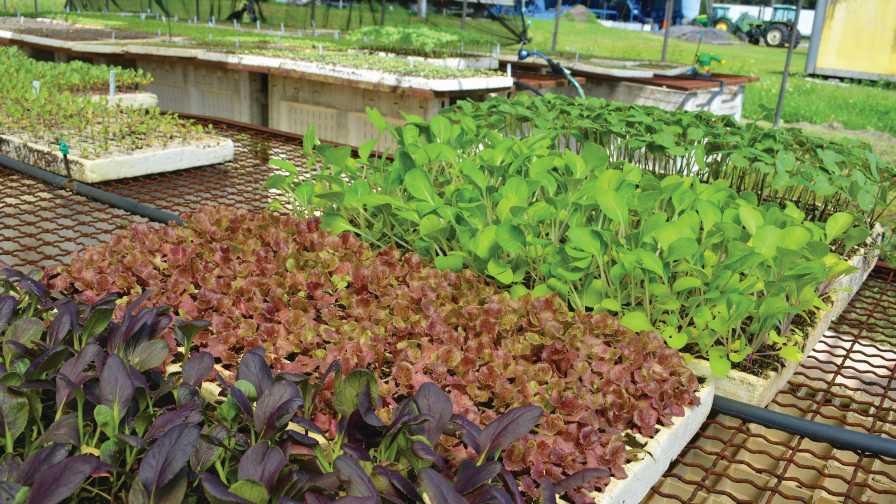
Danny Johns is planting up to 25 new vegetable crops to feed the First Coast Fresh food hub.
Photo by Frank Giles
As for the food hub, Johns adds: “Rather than me growing 50 different vegetables, if I have a neighbor growing broccoli and another growing cabbage, why don’t I source from them? We can create a streamlined location and one-stop shop for everybody where we can supply consumers and chefs.”
First Coast Fresh is currently being supplied by five to six farms after being established three years ago. The benefit of the hub for the growers is to return more of the farm gate value of produce back to the grower by removing middle men and having more control over the prices paid for goods.
“Our volume is not as high as we want yet, but we are working on it,” Johns says. “The goal is to be a reliable, one-stop source of high-quality, locally grown produce. We also are looking to establish our own distribution capabilities through First Coast Fresh.”
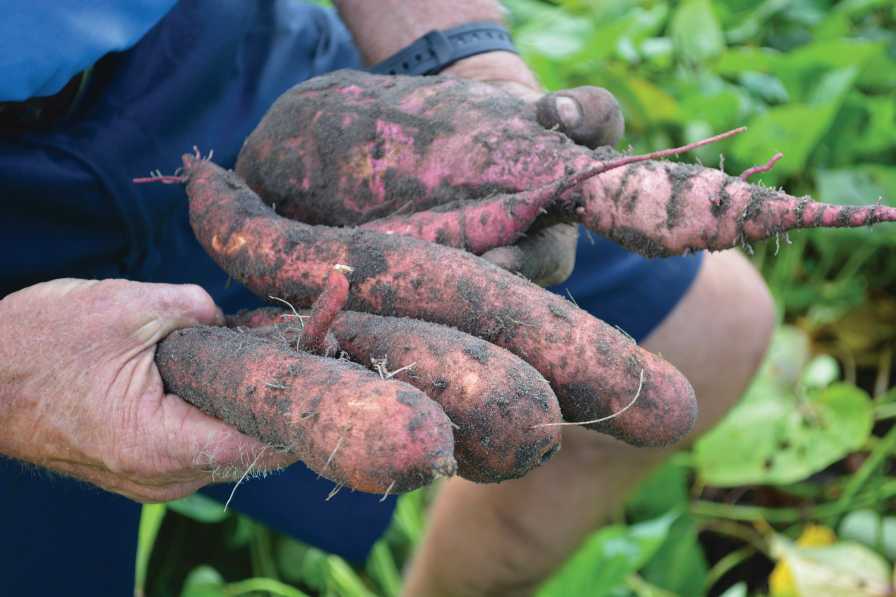
Last season, Danny Johns added sweet potatoes to his product offerings. He has increased acres this season.
Photo by Frank Giles
Markets A Top Consideration
With potatoes being more of a commodity crop, Johns says there has been a considerable learning curve when it comes to marketing direct to consumers.
“It is a whole new ball game,” he says. “What crops do you plant? How do you get the word out to the public you have locally grown produce? What growers do you partner with?”
David Dinkins, a Multicounty Extension Agent with UF/IFAS, consulted with Johns in establishing First Coast Fresh. He says knowing who your market is and why they would buy from you versus other alternatives are the first considerations in starting a food hub. He says once a customer base is determined, there are other things that make for a successful hub.
“Generally speaking, food hubs will need significant facilities and equipment for cooling, storing, packaging, and aggregating products,” Dinkins says. “Ideally, the hub will have refrigerated delivery trucks or contract with other distributors. Employees are needed to carry out the aforementioned tasks along with managing, marketing, food safety, etc.
“In all likelihood, the growers will need to borrow money, so a business plan is a must. What is the best business structure for the food hub? Are other farmers part owners or affiliates who sell the hub products? How far are you from your markets? What products are available from other farms? How far away will you source products and what are your criteria that the farms must meet such as food safety, packaging, delivery, pricing, insurance, shared marketing costs, and dozens of other questions.”
These are all considerations Johns has taken into account as he and his partners grow First Coast Fresh. But, for Johns, it also is about transparency and reconnecting the public with agriculture.
“There is such a disconnect from where our food comes from,” he says. “Everybody used to have a family member who had a farm and you would go spend a week with them on summer vacation, but we have lost that today because people are so removed from the farm. Agriculture has a great story to tell and the food hub allows us to tell it.”
Johns has told his farm story by participating in local farm tours such as Tour De Farm and an event he has personally hosted called the Farm Stroll, which drew 13,000 visitors to his farm over a weekend. In addition, Johns plans to engage local chefs by inviting them to the farm to have a meal prepared with the farm’s fresh produce. He already has queried local chefs about the types of produce they want to serve in their restaurants.
“It is all about showing people what we are doing and growing here,” he says. “Beyond just educating the public, we want to create demand for our product among consumers. And, we are in a great location with Jacksonville, Daytona Beach, and Orlando within close proximity.”
While First Coast Fresh primarily serves CSAs and restaurants currently, Johns says the ideal focus of the business would be selling directly to retail chains like Winn-Dixie and Publix with a branded, locally produced product. And, he is counting on the transparency and opening up of the farm to prompt consumers to ask retailers to stock his product.
Johns already has a deal with Winn-Dixie selling red potatoes in packaging that highlights his farm as the local producer of the product.
“Ideally, our major customers will be chain stores since they have their own distribution systems,” he says. “But, the tie-in with local restaurants and CSAs will be important going forward. It will be an all-of-the-above approach to make this food hub a success.
“I envision a wife driving home from work in the big city and being able to stop into a retail store and being able to buy our locally grown, fresh-quality produce.”
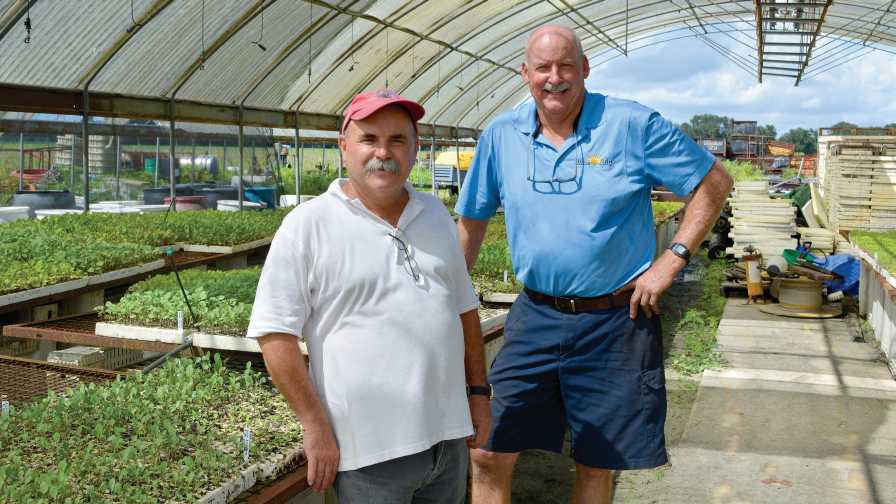
Keith Fuller (left) has joined Blue Sky Farms and Danny Johns to help grow new vegetable crops and market them.
Photo by Frank Giles
Proceed With Caution
According to Dinkins, Johns is building First Coast Fresh with the long-term in mind.
“Danny is proceeding cautiously and deliberately and seeking sound advice from numerous sources,” Dinkins says. “He is diligently managing the overhead expenses associated with the food hub and hiring key personnel to take over the management.”
Johns has brought Keith Fuller on board to help grow the new crops and help with marketing efforts.
“I am good at growing potatoes because our family has been doing it for generations, but with these new crops, there are different challenges with pests, diseases, and weeds,” Johns says. “Keith has good experience growing these crops and it has been fun for me to learn about growing them as well.”
Fuller also is helping with website development, social media marketing, and other community outreach to promote the farm.
Dinkins believes with Johns at the helm, First Coast Fresh is in a good position to grow as local consumers learn what is right in their back yard.
“This food hub is farmer-owned and the products are sourced mostly from multigenerational full-time family farms,” Dinkins says. “As Danny says, ‘First Coast Fresh — We Are The Farmers.’ The Tri-County Agricultural Area farmers are sustainable family farms, which produce hundreds of millions of pounds of healthy fresh produce annually. Consumers want and need fresh, healthy, locally grown food.”
Long-Term Vision
Johns believes there will be a growing demand for businesses like First Coast Fresh. He envisions partnering with growers over a larger geography to provide an even more steady and reliable source of fresh produce.
“I am picturing this as a year-round supply,” he says. “If I have friends growing potatoes in North Carolina, we can source from them, so we are not just talking about our market window here.”
Dinkins says Johns has a passion for farming, helping his neighbors, and his community — all important ingredients of a successful venture.
“Blue Sky Farms is a sustainable family farm and Danny has a proven record of perseverance, a willingness to change, an incredible work ethic, and a commitment to learning about and adopting new farming and marketing practices and technologies,” Dinkins says. “Hopefully, the First Coast Fresh food hub will garner widespread support from consumers, health officials, institutions, and the business community, enabling the establishment of a thriving food hub linking local family farms with their urban neighbors.”







